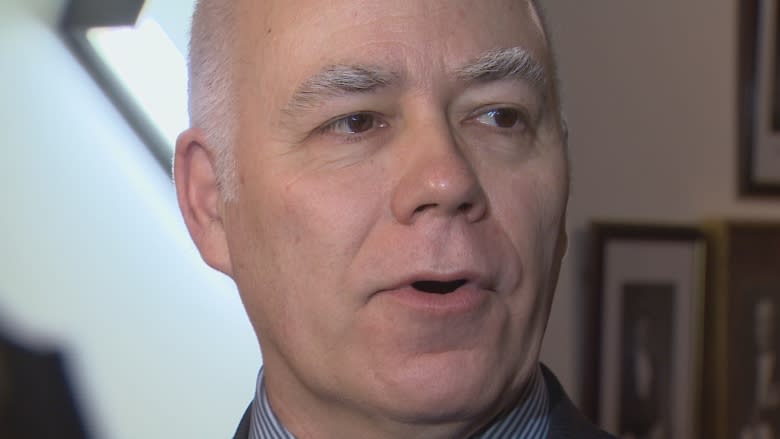Politicians, historian call on CBC to include New Brunswick in The Story of Us
Members of the provincial government are expressing their displeasure with the exclusion of New Brunswick's early history from CBC's docu-drama, Canada: The Story of Us.
Green Party Leader David Coon is calling on the province's tourism minister to request a meeting with the president of CBC and federal government to discuss it.
Coon told the legislature there was barely a "cursory nod" to Indigenous people. He also took issue with the drama saying Samuel de Champlain built the first European settlement in Canada in 1608 near the site of Quebec City.
"Mr. Speaker, every New Brunswicker knows the first European habitation was built on St. Croix Island just off the shore from Bayside, New Brunswick in Charlotte County."
He said this represents the foundation of L'Acadie and French settlement in North America.
The MLA said CBC needs to do better reflect the province to all Canadians.
Margaret Conrad, a professor emeritus at UNB in Fredericton who specializes in the history of Atlantic Canada said she agreed with Coon that the story should have began with the Indigenous people.
The professor said even the general public watching it would wonder why this region of the country wasn't given some early mention.
Serge Rousselle, minister of Local Government and Environment said there's no doubt Part 1 of the docu-drama should have included the Atlantic provinces, Acadia, St. Croix Island and Port Royal.
He said a letter is being sent to the CBC on behalf of the provincial government.
"I was wondering if it's not systematic sometimes that the national CBC and Radio-Canada National to often forget this part, this beautiful part of the world."
No representation
Conrad said it doesn't represent the province very well.
"I started to watch it and I turned it off in part because it had this kind of same heroic kind of voice that as an historian, it makes me grumpy."
She said it was a shame it was so European focused.
"It may be the case that they will double back and talk about what really brought Europeans initially to North America, which as we know were the fisheries."
Conrad also points out how Canadian history is perceived fails to recognize how important the fisheries were to the economy of France, and drew more people to North America than the fur trade.
"It's kind of a false idea that Canada is only founded on the back of the beaver, it's also on the back of cod."
Conrad said there is a preceding chapter to 1608 around the fisheries and the close connection by sea to the Atlantic region for Great Britian and France.
"It's kind of a pity that we don't include all parts of Canada when trying to tell the nation's story."
Conrad said the story of Canada told by most historians is about the story of Ontario and Quebec and the add-ons.
"It's an empire building story more than it is a nation building story."
But Conrad said maybe it's time Atlantic Canada started telling its own story that is exciting, interesting and important.
"I think our people in Atlantic Canada are handicapped by not having their story well told and well taught."
CBC responds
CBC's corporate communications spokesperson Emma Bédard said "It's encouraging that Canadians are so passionate about our history. That passion reflects the different perspectives we all have."
In her statement she said Canada has an incredible rich history that cannot all be captured in 10 episodes.
"Canada: The Story of Us is not meant to be a comprehensive and linear account of Canada's history. It highlights the stories of just a few of the extraordinary people and events that helped shape our nation. All scripts and research were consulted on by numerous prominent historians and consultants working with Bristow Global Media, the producers of the series."
"In telling the story of Champlain and referring to Quebec City as the 'first permanent European settlement' in Canada, the producers chose to define permanence as demonstrated by the settlement's continuous population year-round and their ability to endure the harsh winters from 1608 onward, unlike previous attempts at Sable Island, Sainte-Croix, Tadoussac and Port-Royal. Telling the story of Quebec City also meant they could pursue the narrative of Montcalm and the Plains of Abraham later in the episode.
"Future episodes of the series will feature more stories from Atlantic Canada, including William Hazen and New Brunswick's timber trade during the American Revolution in episode two; Maritime captain and War of 1812 privateer Joseph Barss in episode three; Halifax's Samuel Cunard and the Cunard Steamship and Frederick Gisborne and the installation of North America's first deep-sea telegraph cable between PEI and New Brunswick in episode four; and Nova Scotia's Viola Desmond and Newfoundland's Joey Smallwood in episode nine."
Bédard said CBC hopes that in watching Canada: Story of Us, Canadians will discover new stories about their history and will encourage them to keep learning.



